“Empowering Lives: Human-Centered Innovation in Health, Wellness, Aging, and Abilities”


Population ageing is creating an increasing demand for long-term care and rehabilitation services, particularly in low- and middle-income countries where access to institutional healthcare remains limited. Affordable rehabilitation and assistive robotics offer a transformative solution by extending functional independence, enhancing mobility, and reducing caregiver burden through home-based care. To address mobility limitations, a wheelchair–exoskeleton hybrid robot has been proposed. The robotic wheelchair, equipped with compact drive wheels, provides stable and energy-efficient mobility on smooth surfaces with minimal risk of falling. In contrast, the standing mode enables bipedal walking, stair ascent, and traversal of uneven terrain. A retractable lifting mechanism functions as an active body-weight support system for gait training, facilitating sit-to-stand transitions and upright ambulation. Furthermore, leg exoskeletons employing parallel elastic elements can reduce actuator peak torque and energy consumption, allowing the use of lower gear ratios and enhancing backdrivability for improved safety and compliance. For upper-limb rehabilitation, a desktop rehabilitation robot utilizing BLDC motors has been developed as a low-cost device for home-based therapy. The system applies the mechanical impedance tunnel concept to realize assist-as-needed control in combination with interactive gaming. Continuous monitoring of patient activity enables real-time adjustment of training difficulty to optimize rehabilitation outcomes. The platform also encourages social interaction with family members, friends, and other patients. To reflect cultural identity and promote engagement, Thai cultural elements and tourist attractions are incorporated into the game design—supporting the broader vision of advancing medical tourism and positioning Thailand as a retirement-friendly global destination.
Ronnapee Chaichaowarat is an Associate Professor at the International School of Engineering, Chulalongkorn University, Thailand. He was a Postdoctoral Associate at the Department of Mechanical Engineering, Massachusetts Institute of Technology (MIT) from 2019 to 2020. He received the B.Eng. (First Class Honours), M.Eng., and Ph.D. degrees in Mechanical Engineering from Chulalongkorn University in 2012, 2013, and 2015, respectively, under the Junior Science Talent Project Scholarship from the National Science and Technology Development Agency (NSTDA) of Thailand. Supported by the Japanese Government (MEXT) Scholarship, he earned a second Ph.D. in Bioengineering and Robotics from Tohoku University, Japan, in 2018. Dr. Chaichaowarat is a Senior Member of IEEE and currently serves as Vice Chair of the IEEE Robotics and Automation Society (RAS) Thailand Chapter. His research interests include rehabilitation robotics, exoskeletons, compliant actuation, and physical human–robot interaction. He received the Outstanding Young Researcher Award from Chulalongkorn University in 2024 and was the runner-up for the Young Technologist Award 2024 from the Foundation for the Promotion of Science and Technology under the Patronage of His Majesty the King. His research on affordable assistive and rehabilitation robots, such as the wheelchair–exoskeleton hybrid robot, has been featured in leading newspapers and national
television in Thailand.


Robotic assisted surgery is a paradigm shifting technology in contemporary healthcare in the 21st-century era of surgery that improves precision, three-dimensional (3D) imaging, and has better patient outcomes in various surgical specialties. The combination of soft robotics with computation is becoming a game changer in neurosurgery within challenging brain and spine surgery. Transition from the bulky and stiff traditional robot to compliant soft robotic platforms in minimally invasive surgery fulfills critical shortcomings, such as (i) restricted navigation in workspace, (ii) insufficient instrument triangulation, and (iii) risk of tissue injury. Soft robotics are constructed with biocompatible elastomeric materials that have moduli reflecting those of biological matter, allowing for safe human-robot interaction, increasing efficacy in difficult anatomical regions. There are many applications of soft robotics including continuum robots for access neuroanatomy, flexible endoscopic systems for accessing the skull base, and precision guided robotics for spinal instruments. The current clinical evidence supports significant advantages in robot-assisted spinal surgery, including enhanced accuracy in pedicle screw placement, reduced radiation exposure, and improved cost-effectiveness in high-volume centers. The inclusion of computational intelligence in robotic platforms can allow for intra-operative trajectory modification, considerations to support intraoperative decision making, and predictive analytic models for pre-surveillance planning surgery based on surgical history and instrumentation. More recent advances coupling digital twin modeling, haptics feedback devices, and virtual performance analysis can help improve patient outcomes and assist during surgical procedures.
Associate Professor Commander Sorayouth Chumnanvej, M.D., Ph.D. is a neurosurgeon at the Neurosurgery Unit, Surgery Department, Faculty of Medicine Ramathibodi Hospital, Mahidol University, Bangkok, Thailand. He earned his medical degree from Thammasat University (1997) and completed his neurosurgery board certification at Mahidol University (2001), followed by a Clinical Research Fellowship in Cerebrovascular Surgery at Harvard Medical School (2005). Dr. Chumnanvej holds a Ph.D. in Biomedical Engineering from Mahidol University (2019) and has completed advanced training in robotic surgery, including the Mazor Robotics Renaissance Training Course at Nicholson Center, Florida (2013). His research focuses on surgical robotics, robotic-assisted surgery, digital twin technology, cerebrovascular surgery, and spinal instrumentation. With over 20 years of neurosurgical experience, Dr. Chumnanvej has authored more than 70 peer-reviewed publications and holds multiple patents, including innovations in surgical robots for endonasal endoscopic transsphenoidal approaches. His recent work on robot-assisted spinal surgery and digital twin technology in neurosurgery has received international recognition. He was awarded the prestigious “Beloved Medical Teacher Award” (2025) and the ICS Inventor Award (2019). Dr. Chumnanvej is a Fellow of the Royal College of Surgeons of Thailand (FRCST) and the Royal College of Neurological Surgeons of Thailand (FRCNST). He has presented at numerous international conferences and symposiums, including the Medical Fair Asia 2024 on remote surgical training and the Advanced Skull Base Masterclass 2025 in Singapore.


The 18 th International Convention on Rehabilitation Engineering and Assistive Technology (i-CREATe 2025) which will be held on November 24th-26th, 2025 at Bangkok, Thailand.


The Information Technology Foundation under the Initiative of Her Royal Highness Princess Maha Chakri Sirindhorn
73/1 National Science and Technology Development Agency Building, Rama 6 Road, Ratchatewi, Bangkok 10400, Thailand
Center for Biomedical and Robotics Technology
(BART LAB)
Faculty of Engineering, Mahidol University
999 Phutthamonthon Sai 4 Rd, Salaya,
Phutthamonthon, Nakhon Pathom 73170, Thailand
National Science and Technology Development Agency (NSTDA)
Thailand Science Park,
111 Khlong Nung, Phahonyothin Rd.
Khlong Luang, Pathum Thani 12120, Thailand
Copyright 2025 All Rights Reserved